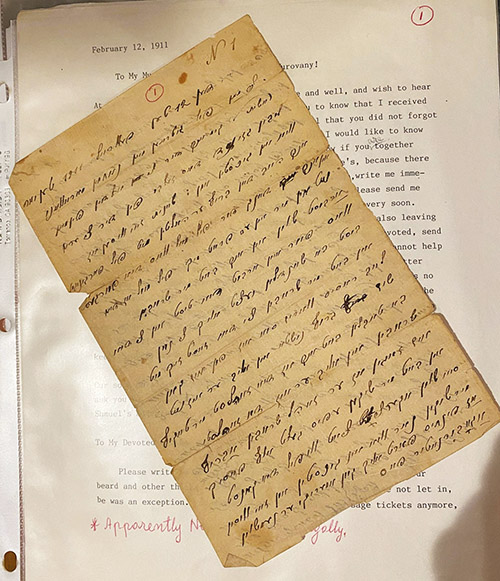
My grandmother talked to God a lot. It’s evident from the letter she sent to my grandfather in 1911. Or was it 1912? Read on.
My father was born in the Pale of Settlement in Eastern Europe on February 14, 1911. That date is questionable, depending on whether you’re looking at the Julian or Gregorian calendar. In either case, my father was born in February 1911.
Notably, my grandmother would not have dictated a letter to my grandfather on February 12, 1911, mentioning their son by the name given to my father at his brit milah, Berl. He was not yet born or newborn, depending on the calendar used.
My grandfather’s brother Shmuel penned the note in Yiddish for my grandmother. He probably mistakenly wrote 1911 when a month earlier, the calendar year had already changed to 1912.
That must be the cause of the confusion. My grandfather left his homeland on the Batavia ship from Hamburg, arriving in America on January 12, 1911, leaving my grandmother pregnant. Following the usual steps, after saving money and securing the passenger ticket for the vessel, my grandfather sent for my grandmother. She arrived at Ellis Island on September 18, 1912, together with my toddler uncle and my baby father.
At Ellis Island, my grandfather, Nathan Mark, whose name at the entry to the United States was recorded as Nachmen Murowany (aka Nachman Murovany), met his baby, Berl, my father, for the first time. Thanks to his first public school teacher in Newark, New Jersey, my father, eventually, became known as Benjamin.
The letter, which I’ve had in my possession since clearing my Aunt Fannie’s belongings when she passed away in 1993, is so telling. While those names and dates were questionable and sometimes changed, some things endure.
When I read the priceless letter for the umpteenth time, one of the only pieces of memorabilia from my grandmother, whose name I carry, it struck me that throughout the generations, some things never change. It was not quite mid-February, and my grandmother’s thoughts already focused on Passover preparations. Concerned about having the assets needed to prepare for the spring festival holiday, she requested that my grandfather “please send me some money for the Passover holiday, which is approaching very soon. Send as much as you can afford.”
Although the first Seder fell earlier in April 1912 than it did in April 1911, either way, it was in April. This year, the first Seder is on Friday, April 15. Yet, while it’s only February, I already cautioned my husband that we need to cut back on filling the shelves with staple goods. That’s more difficult with a new mindset due to the supply chain issues and shortages during the pandemic.
My grandmother’s letter, addressed to “My Much Devoted Husband Nachman Murovany,” speaks to God and offers thanks to God for all the good things in their lives. Her words penetrated my soul.
In that revealing letter, my grandmother came to life for me. Her palpable pleas permeate the page, where it says, “Send often letters because I feel lonesome without you. However I cannot help me, God will help us and we will soon be together again with a better life, and much improvement of our lives. God has to help us. He has no choice, but I pray to him to speed up His help.” (sic)
You can feel the love in her choice of words. And I quote, “Be well my beloved husband, may God give [you] energy to work hard, and keep thinking about me.”
The comment and request post-signing off as “Your beloved wife Sarah Murovany” is precious. It reads, “Our sons Moishele and Berl are sending greetings and many kisses, they ask you to send them American nuts for Passover.” As an infant, my father would not be eating nuts if newborn or born only a few months earlier. That confirms my doubts about the letter dated the month of my father’s birth.
Finally, she cautioned, “Send the letters to Shmuel’s address and sign Kuznetzov.*” Granduncle Shmuel added to the letter he wrote for my grandmother by inquiring about my grandfather’s trip to America. He asked, “Did they let you in with your beard and other things, because Yellik [another brother who settled in America] wrote that others were not let in, he was an exception. At present they don’t issue passage tickets anymore.”
If only I knew my grandparents. Would I have asked them questions? Would they have told me their story? What more could I have learned? As clear as day, the lessons illuminate this poignant solo letter formally addressed from my grandmother to my grandfather, which my aunt saved.
The takeaways were, “Thank God,” say “Amen,” and, in February, get in the mindset of Passover.
As you can see in the typed English version of the letter, my cousin Harry, the translator, added an asterisk and posed an unsettling conclusion. Harry wrote: “*Apparently Nachman left illegally.”
That’s a whole other question.
Sharon Mark Cohen, MPA, is a seasoned genealogist and journalist. Sharon is a people person and born storyteller who believes that everyone deserves a legacy. Follow her Tuesday blog posts at sharonmarkcohen.com. She responds to all fan mail.









